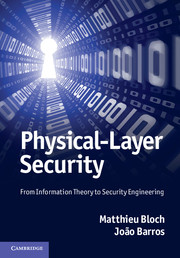Book contents
- Frontmatter
- Contents
- Preface
- Notation
- List of abbreviations
- Part I Preliminaries
- Part II Information-theoretic security
- 3 Secrecy capacity
- 4 Secret-key capacity
- 5 Security limits of Gaussian and wireless channels
- Part III Coding and system aspects
- Part IV Other applications of information-theoretic security
- References
- Author index
- Subject index
3 - Secrecy capacity
from Part II - Information-theoretic security
Published online by Cambridge University Press: 07 October 2011
- Frontmatter
- Contents
- Preface
- Notation
- List of abbreviations
- Part I Preliminaries
- Part II Information-theoretic security
- 3 Secrecy capacity
- 4 Secret-key capacity
- 5 Security limits of Gaussian and wireless channels
- Part III Coding and system aspects
- Part IV Other applications of information-theoretic security
- References
- Author index
- Subject index
Summary
In this chapter, we develop the notion of secrecy capacity, which plays a central role in physical-layer security. The secrecy capacity characterizes the fundamental limit of secure communications over noisy channels, and it is essentially the counterpart to the usual point-to-point channel capacity when communications are subject not only to reliability constraints but also to an information-theoretic secrecy requirement. It is inherently associated with a channel model called the wiretap channel, which is a broadcast channel in which one of the receivers is treated as an adversary. This adversarial receiver, which we call the eavesdropper to emphasize its passiveness, should remain ignorant of the messages transmitted over the channel. The mathematical tools, and especially the random-coding argument, presented in this chapter are the basis for most of the theoretical research in physical-layer security, and we use them extensively in subsequent chapters.
We start with a review of Shannon's model of secure communications (Section 3.1), and then we informally discuss the problem of secure communications over noisy channels (Section 3.2). The intuition we develop from loose arguments is useful to grasp the concepts underlying the proofs of the secrecy capacity and motivates a discussion of the choice of an information-theoretic secrecy metric (Section 3.3). We then study in detail the fundamental limits of secure communication over degraded wiretap channels (Section 3.4) and broadcast channels with confidential messages (Section 3.5).
- Type
- Chapter
- Information
- Physical-Layer SecurityFrom Information Theory to Security Engineering, pp. 49 - 111Publisher: Cambridge University PressPrint publication year: 2011
- 2
- Cited by



